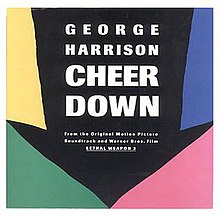Cheer Down
| "Cheer Down" | ||||
|---|---|---|---|---|

US picture sleeve
|
||||
| Single by George Harrison | ||||
| from the album Lethal Weapon 2 | ||||
| B-side | "That's What It Takes" (US) "Poor Little Girl" (UK) |
|||
| Released | 22 August 1989 (US) 27 November 1989 (UK) |
|||
| Format | 7-inch vinyl, cassette, CD, 12-inch vinyl | |||
| Recorded | 1987, March 1989, FPSHOT, Oxfordshire |
|||
| Genre | Rock | |||
| Length | 4:08 | |||
| Label | Warner Bros. (US), Dark Horse (UK) | |||
| Writer(s) | George Harrison, Tom Petty | |||
| Producer(s) | George Harrison, Jeff Lynne | |||
| George Harrison singles chronology | ||||
|
||||
"Cheer Down" is a song by English musician George Harrison that was first released in 1989. The track was his contribution to the soundtrack of the film Lethal Weapon 2 and was also issued as a single. Harrison wrote the song with Tom Petty and co-produced the recording with Jeff Lynne.
The song has appeared on the Harrison compilation albums Best of Dark Horse and Let It Roll. A live version recorded with Eric Clapton was included on Harrison's 1992 album Live in Japan.
The title of the song is attributed to Harrison's wife Olivia, who would tell her husband, "Okay, cheer down, big fellow" when he became too enthusiastic. Harrison first recorded a rhythm track for the song during the sessions for his 1987 album Cloud Nine. He subsequently finished the lyrics with assistance from Tom Petty. The following year, along with "Run So Far" and "That Kind of Woman", "Cheer Down" was among the four compositions that Harrison offered to Eric Clapton for inclusion on the latter's album Journeyman. Clapton instead decided to use it for the soundtrack to the film Lethal Weapon 2, which he had been commissioned to supply, but he persuaded Harrison to contribute his own recording for inclusion in the film.
Harrison completed "Cheer Down" at his home studio, FPSHOT, in March 1989. The song was again co-produced by Jeff Lynne, who had served the same role on Cloud Nine, in addition to forming the Traveling Wilburys with Harrison and Petty. The completed recording features a long closing slide guitar solo that author Simon Leng admires for its fluency and variation. In Leng's description, during this section, Harrison's playing "runs the gamut from Indian blues chops to two-part countermelodies and sweeping Pete Drake jaunts through the octaves".
...
Wikipedia
